
After a 16-year absence, “King of the Hill” will make its comeback this August on Hulu. The original series, known for its humor and depiction of every fan’s beloved propane dealer, Hank Hill, and his family, spanned over 13 seasons. In the upcoming revival, Hank and Peggy return to their home in Arlen, Texas, following a long stay in Saudi Arabia, to witness the transformation in their community – and the things that remain unchanged. One thing is certain: Their son, Bobby, has undergone a significant growth spurt and is now much taller than before. “That boy ain’t right,” but at least he’s finally growing up.
Covering 13 seasons of television is quite extensive, and while immersing oneself in the entirety of ‘King of the Hill’ is undeniably rewarding, here are 15 episodes that truly embody this series as one of the most uniquely quirky yet deeply human shows birthed from adult animation. The heart that Hank and his companions exude is evident right from the get-go.
“Pilot,” Season 1, Episode 1

In many episodes from the early seasons of “King of the Hill,” a recurring narrative structure can be observed: Hank Hill (played by Mike Judge) frequently finds himself in situations where he’s incorrect about something, his obstinacy exacerbates the problem, and eventually, he realizes his error and alters his behavior. This formula is common in sitcoms, with main characters often maintaining consistency or defined traits, so Hank’s development is gradual. However, the writers continue to revisit this theme because it’s both impactful and fulfilling, as Hank, fundamentally, is a good person.
In the initial episode, Hank’s frustration over his son Bobby (played by Pamela Adlon) not sharing his interests and a physical altercion during a baseball game leads townsfolk to suspect Hank of abuse. This misunderstanding forces Hank to recognize that his actions impact Bobby deeply, and he can’t expect the bond he desires without making an effort too. The storyline unfolds comically, gathering momentum until it reaches a heartwarming conclusion – a plot twist typical of the emotional depth found in King of the Hill.
“Shins of the Father,” Season 1, Episode 8
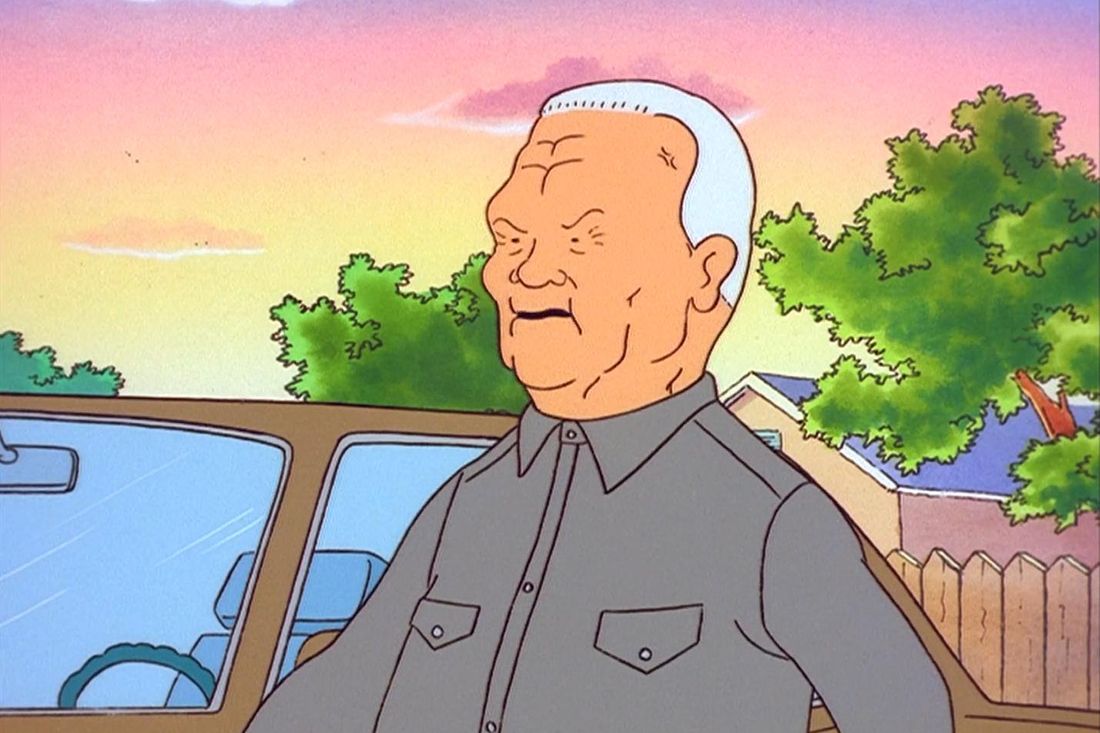
It’s clear in the show King of the Hill that numerous life lessons are shared and it’s crucial to acknowledge and understand one’s upbringing to move forward effectively. For instance, Luanne, Hank’s niece (played by the late Brittany Murphy), faces difficulties finding her path in life due to limited inspiration from her family. And Hank’s efforts to raise his son according to traditional masculine values often mirror those of his father, Cotton (portrayed by Toby Huss).
In “King of the Hill,” a veteran named Cotton, who tragically lost his shins in World War II, attempts to instill his distorted views on women and household duties onto Bobby. Initially, these ideas don’t sit well with Hank, but as time goes on, Bobby starts showing some signs of agreement, causing Hank to feel increasingly horrified. Throughout the series, Hank and Peggy (Kathy Najimy) find themselves having to challenge Cotton’s influence while also standing up for their own beliefs. As the story unfolds in “King of the Hill,” it becomes evident that Cotton will never genuinely be proud of Hank or approve of his ways, despite occasionally mirroring his father’s behavior subconsciously. The episode titled “Shins of the Father” marks the beginning of Bobby’s journey towards becoming his own person.
“Hilloween,” Season 2, Episode 4
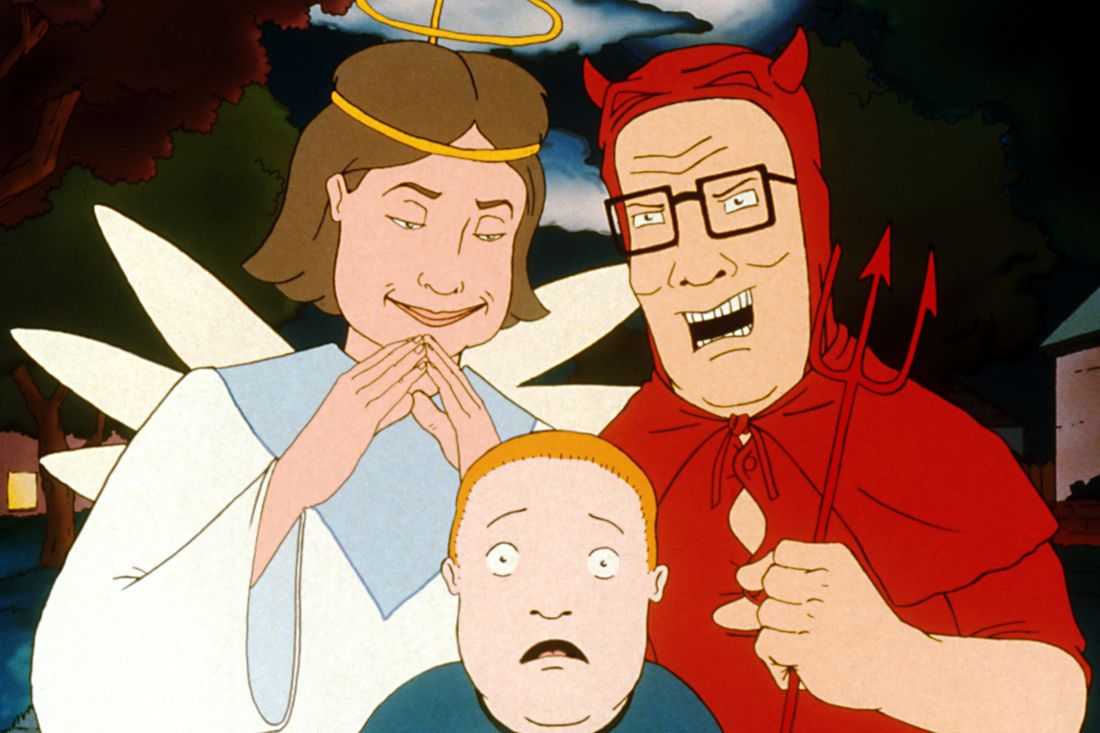
The majority of the principal figures in the TV show “King of the Hill” tend to lean towards traditional conservatism. Characters such as Hank, who adheres to tradition, and Dale Gribble, who is known for his conspiracy theories (previously portrayed by Johnny Hardwick), exemplify this conservative stance. However, the series frequently poked fun at individuals whose beliefs have become distorted into irritating extremism, like in “Hilloween,” where a woman from the local bible study tries to persuade Arlen residents to shun Halloween. Her religious alternative, Hallelujah House, infuriates Hank, and the episode concludes with him dressing up as a devil and leading a protest against her.
The episode highlights the various facets of Peggy Hill, a woman who is frequently motivated by her ego. Yet, this trait isn’t necessarily negative. When Luanne attempts to persuade Bobby about the virtues of Hallelujah House, Peggy rebukes her for meddling in matters that aren’t her concern. In reality, this is Peggy asserting her authority over Bobby, but it also demonstrates her profound affection for her son and her desire to protect him from getting involved in a meaningless moral campaign, especially on Halloween.
“The Company Man,” Season 2, Episode 9
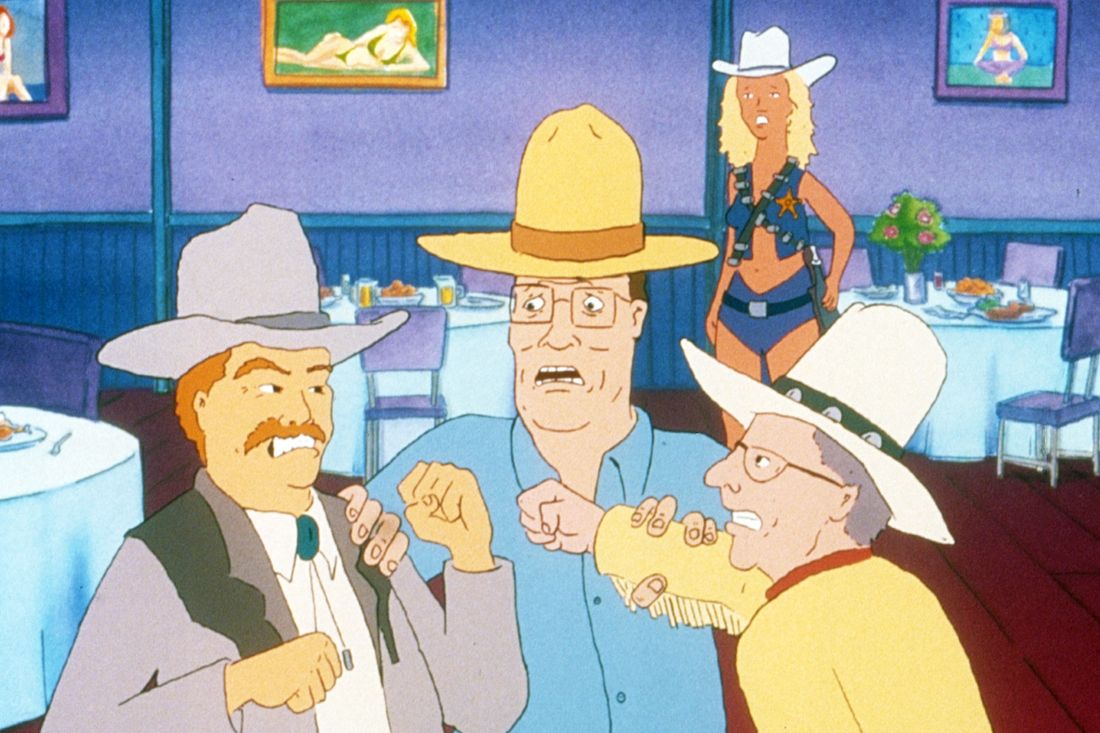
Arlen, located within Texas, deviates from the typical image of Texas. Unlike the stereotypical scene with cowboy boots, large belt buckles, or wide-brim hats, it is home to Hank Hill, a man who prefers spending his time drinking beer and managing his propane business. The series “The Company Man” features Burt Reynolds, one of the beloved celebrity voice actors in the show, as M.F. Thaterton, the proprietor of a rival propane company, eager to secure the same client as Hank’s Strickland Propane.
In an attempt to please the client, Hank guides him and caters to his longing for a traditional Texas experience. However, his devotion to the craft of propane deals proves stronger than his desire to construct a rustic, country-western ambiance. Despite having a distinctive accent that sets him apart in the world of adult animation, Hank prefers not to be labeled solely by it.
“Pretty, Pretty Dresses,” Season 3, Episode 9
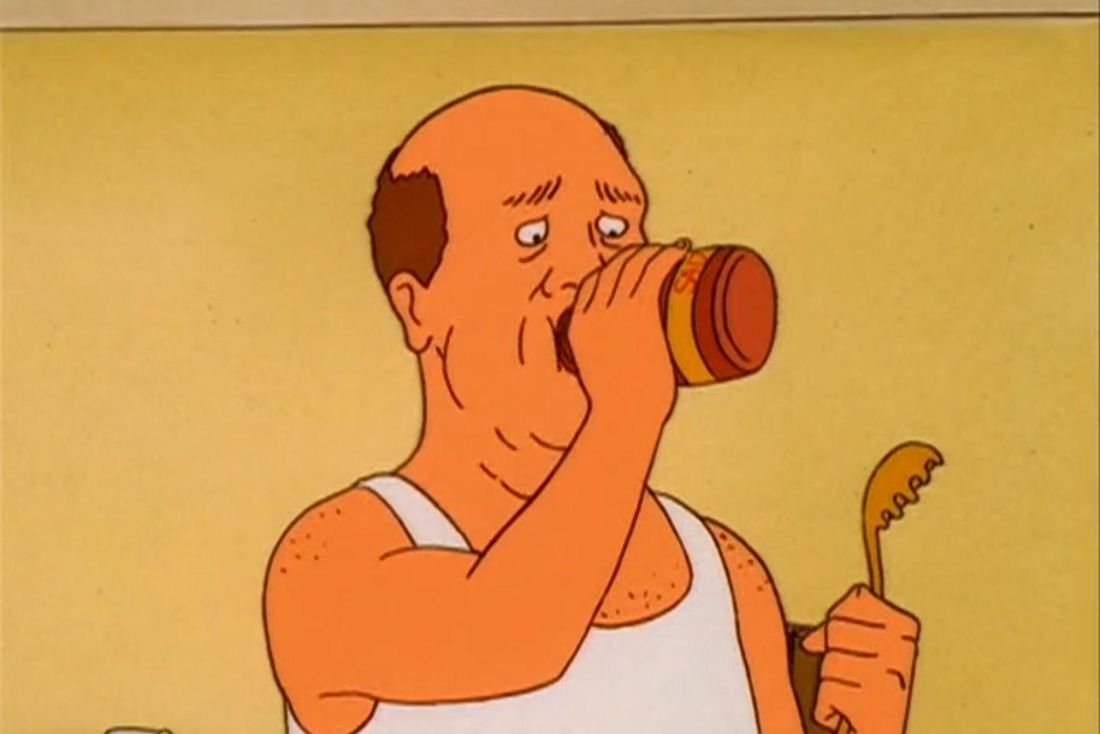
The characters from “King of the Hill” were not shielded from the pain of their past experiences. For instance, Bill, Hank’s longtime friend who often appears slovenly, descends into despair during Christmas due to his ex-wife’s infidelity and abandonment. This event consumes him; he leaves gifts as a hopeful gesture for her return, spoils meals by reminiscing about his heartache, and even makes a feeble attempt at ending his life by jumping from an eight-foot high roof.
The story reaches its peak when Bill shows up at a Christmas party dressed as his ex-girlfriend, mimicking her behavior. Instead of taking a humorous turn, the sitcom “King of the Hill” handles this with a touch of melancholy. To console Bill from the ridicule he’s facing, Hank puts on a dress too, impersonates Bill’s ex, and encourages him to let go. It’s an absurd, heartfelt act, but it’s characteristic of the hidden affection that Hank is unable to openly express.
“Wings of the Dope,” Season 3, Episode 23
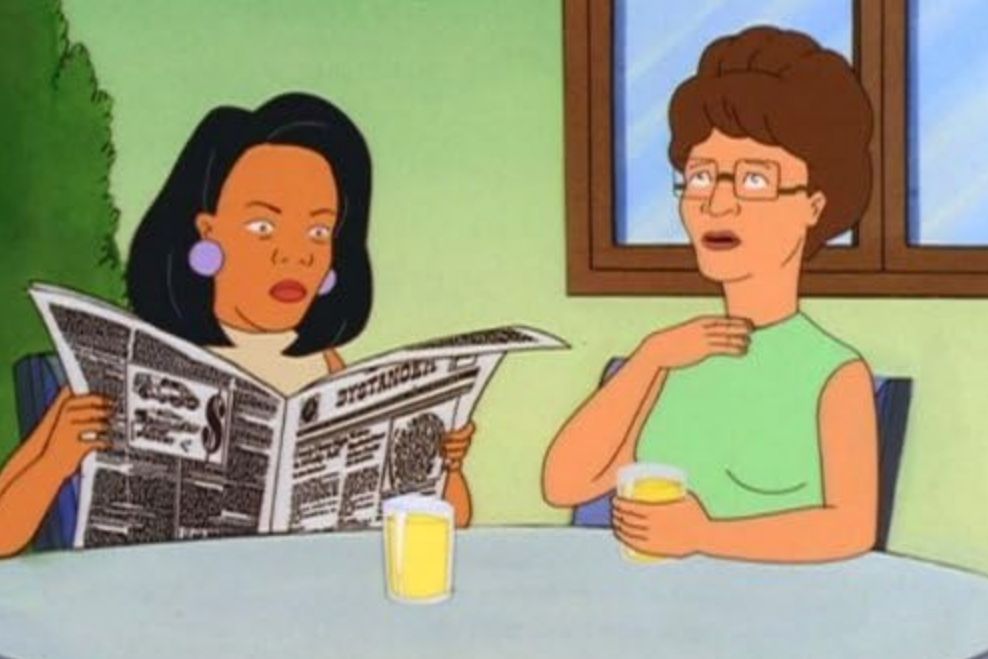
Discussing the scarcity of genuine affection expressed by characters from the show “King of the Hill”, it could be more challenging to observe them managing grief appropriately. In the episode titled “Wings of the Dope”, Luanne, who is often naive, sensitive, and struggles to fit in within Arlen society, grapples with the loss of her apathetic boyfriend, Buckley (David Herman), after a tragic accident at Mega Lo Mart. Despite her usual struggles, this time she’s dealing with the grief of losing her partner. The townsfolk react variously when Luanne shares that she sees visions of Buckley with angel wings. Some empathize with her belief, while others are concerned that her claims might be hallucinations brought on by excessive use of hair care products.
In essence, as Buckley moved forward, Luanne too found room to evolve. She opted to join Arlen Community College and reshape her professional path. Meanwhile, Buckley managed to enhance his standing beyond just being a hapless store clerk. The trampoline jump scene set to “Life in a Northern Town” stands out as one of the most movingly beautiful episodes in the series. It encapsulates youthful romance, wistfulness, and an otherworldly quirkiness – all characteristic traits of a show populated by emotionally immature characters, each baring their hearts openly.
“To Kill a Ladybird,” Season 4, Episode 9
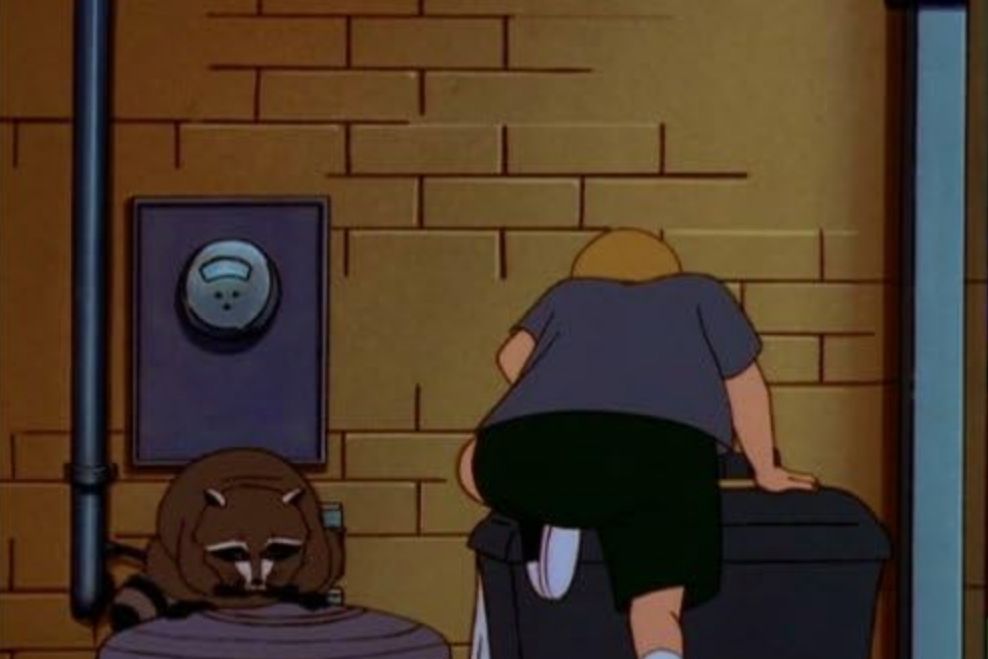
In contrast to certain animated sitcoms that could successfully traverse into Looney Tunes realms, the forays of King of the Hill into absurdity sometimes felt out of place (yet it provided meme-worthy humor with episodes like “Ho, Yeah!”, where Hank inadvertently took on a “pimp” role). The show truly shone when it addressed its recurring theme of paranoia, such as in “To Kill a Ladybird”, where Bobby acquires a raccoon as a pet and Dale, upon attempting to capture the animal, becomes convinced that it has rabies.
Eventually, Dale retreats deep into the forest, establishing a camp that blends elements of “Lord of the Flies” and “Deliverance”. Although unconventional, this setting effectively complements his character development. Being predisposed to delusions, fear amplifies Dale’s eccentricities, showcasing the writers’ talent during the King of the Hill era. It is simple to place characters in extraordinary situations, but it is far more rewarding to explore a character’s comedic potential fully.
“Nancy Boys,” Season 4, Episode 21
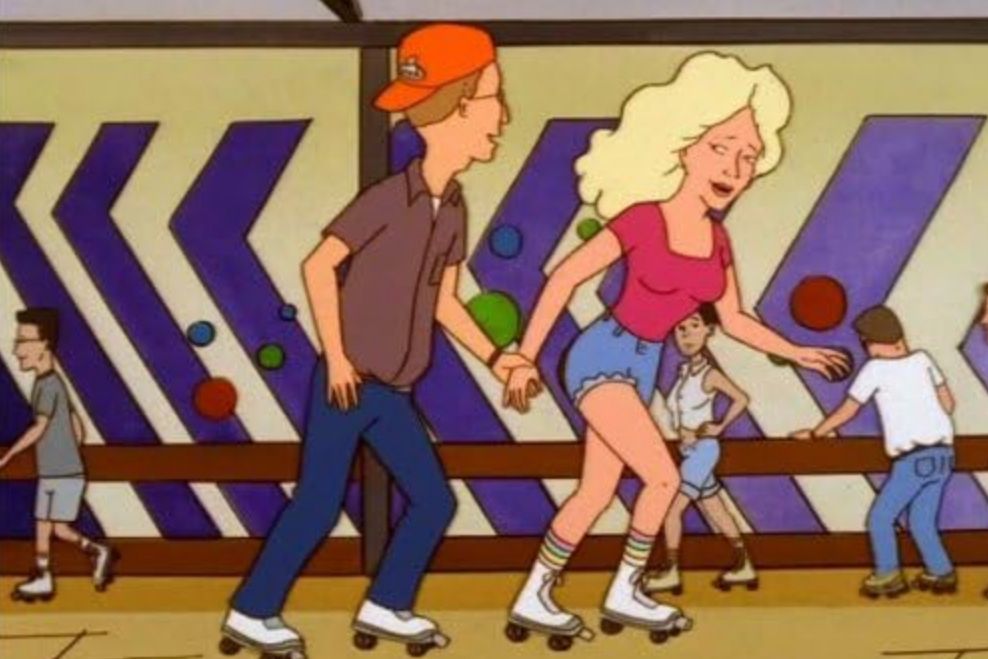
In the early seasons of “King of the Hill,” there was a recurring gag that Dale’s wife, Nancy (portrayed by Ashley Gardner), was having an open relationship with John Redcorn (originally played by Victor Aaron and later by Jonathan Joss). Despite his son Joseph (Breckin Meyer) bearing a strong resemblance to John, Dale remained oblivious. However, the show chose to move past this joke in the fourth season, having John and Nancy end their affair in an episode. This twist provides an intriguing exploration of the characters, who could have been one-dimensional, but instead are given the opportunity for growth and change.
Following a fervent act of assistance by Dale against the Bureau of Indian Affairs in his dispute with John, John realizes he doesn’t want to potentially cause further distress for Dale, even if he remains unaware. Simultaneously, Nancy rekindles her affection for Dale as he shows affectionate gestures towards her, and despite her own shortcomings, she also chooses to shield her husband from any more suffering. In the television series King of the Hill, moments of change are called upon, and the most admirable instances occur when characters choose to listen and adapt.
“I Don’t Want to Wait,” Season 5, Episode 3
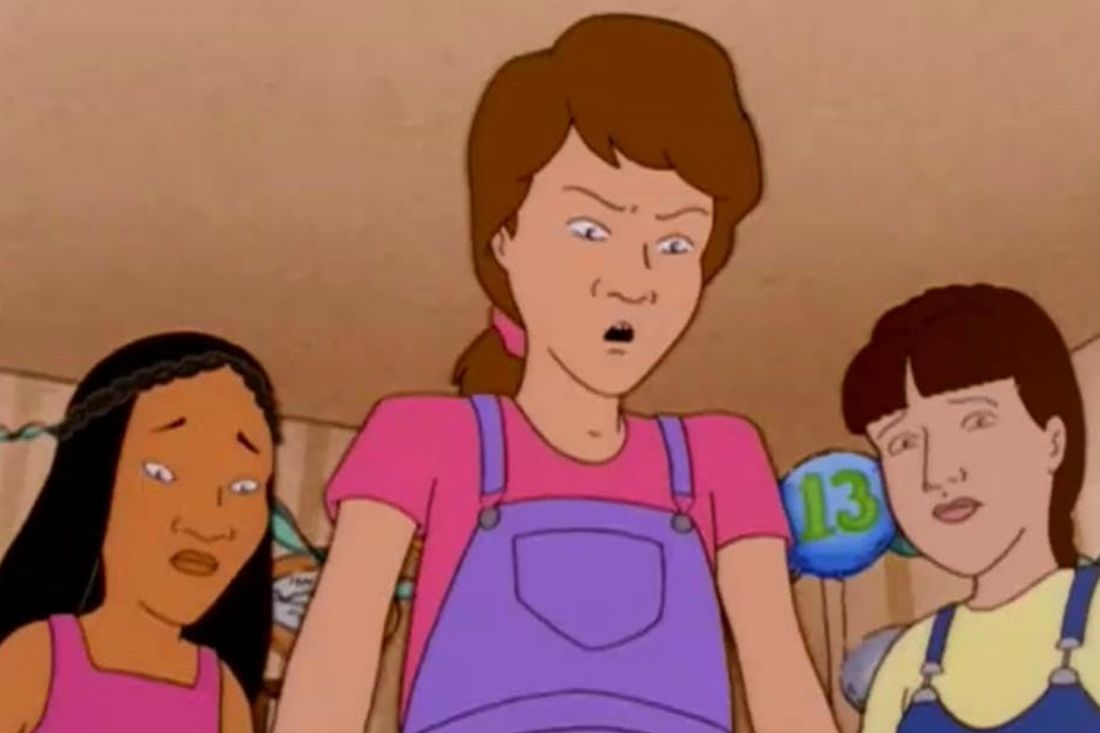
In a heartfelt episode, it’s always captivating when Bobby Hill experiences longing for affection. The episode “I Don’t Want to Wait” stands out as particularly poignant because of its relatability and personal touch. At the brink of his teenage years, Bobby is savoring the subtle glimpses of maturity he encounters. Yet, when he realizes that his friend Joseph has significantly grown during summer break, Bobby becomes anxious and fearful. Simultaneously, Joseph grapples with the torment of his own newfound crush on a girl, along with an obsession over cleavage. Neither boy is prepared to acknowledge their vulnerabilities openly.
The situation spirals into a whirlwind of hormonal chaos, particularly when Bobby, who is already causing distress with his actions towards Connie, witnesses Joseph and Connie (played by Lauren Tom) passionately kissing. The show King of the Hill often explored the ennui of adulthood and the pains that arise from fulfilling one’s responsibilities as a parent. However, it was also proficient in depicting growing up as both marvelous and chaotic, yet profoundly funny.
“Chasing Bobby,” Season 5, Episode 9
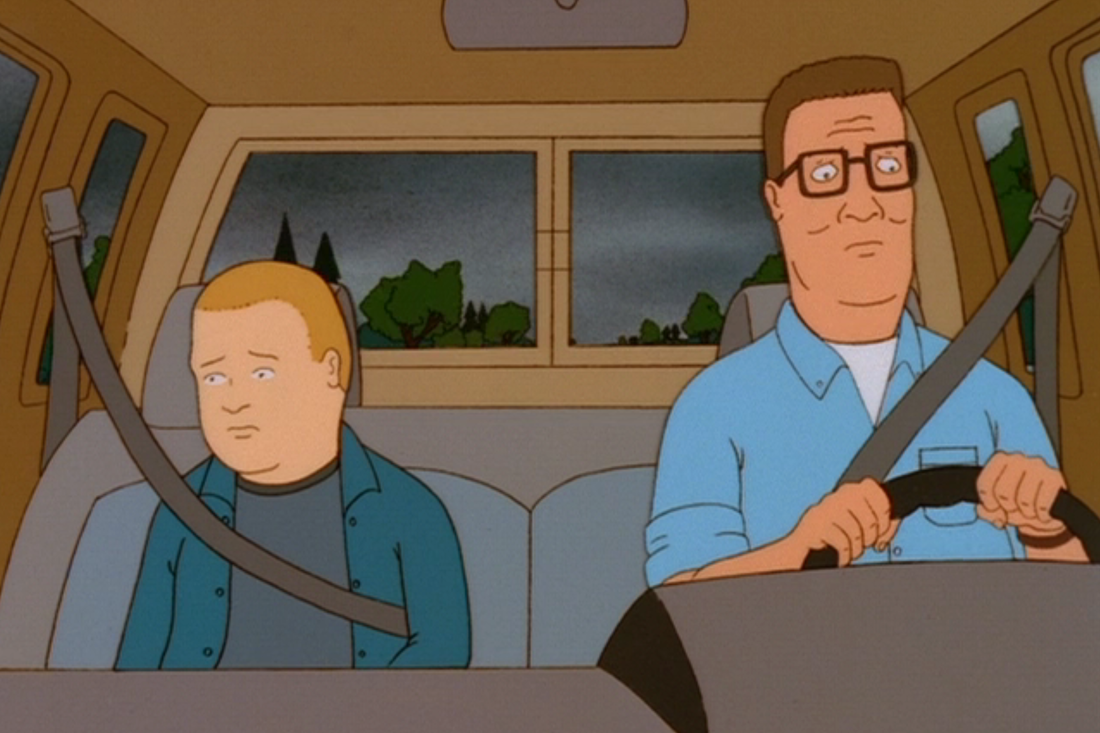
Hank Hill strives to maintain a stoic demeanor, leading to fissures appearing under the strain of his feelings. His signature “BWAAAAH!” outburst seems like an individual who only expresses emotion when the dam bursts. And when Hank struggles to accept the deterioration of his aged truck, he ends up crying in a cinema – not due to the film’s storyline about a dying elderly man, but because he links that old man with his old vehicle.
Is Hank unknowingly grappling with the concept that everything, including people and vehicles, naturally age and eventually pass away? This isn’t unusual; when Hank injures his back in “Hank’s Back,” it challenges his entire self-image. Nevertheless, the truck’s demise ultimately leads to a meaningful moment between Hank, Bobby, and the most trusted elder figure Hank knows – the memory of his old truck.
“Hank’s Back Story,” Season 5, Episode 19

Several episodes from this collection are included because they touch upon the emotional heart of King of the Hill, but the series also excelled at delivering humorous, off-the-wall antics. In “Hank’s Back Story,” Hank discovers that his back pain is caused by a condition that has left him with essentially no buttocks. Consequently, he’s been sitting on his pelvis for years. To heal, Hank must wear a prosthetic rear end.
The animation in “King of the Hill” wasn’t overly complex; instead, it aimed for a relatable, everyday feel, with characters moving without much finesse. However, the episode “Hank’s Back Story” showcases some delightful physical humor. Even something as simple as Hank standing in his hospital gown, exposing only a bit of his backside, is hilarious in an unexpected way. Essentially, “King of the Hill” seamlessly shifts into a different yet equally impressive gear with this episode.
“Bobby Goes Nuts,” Season 6, Episode 1
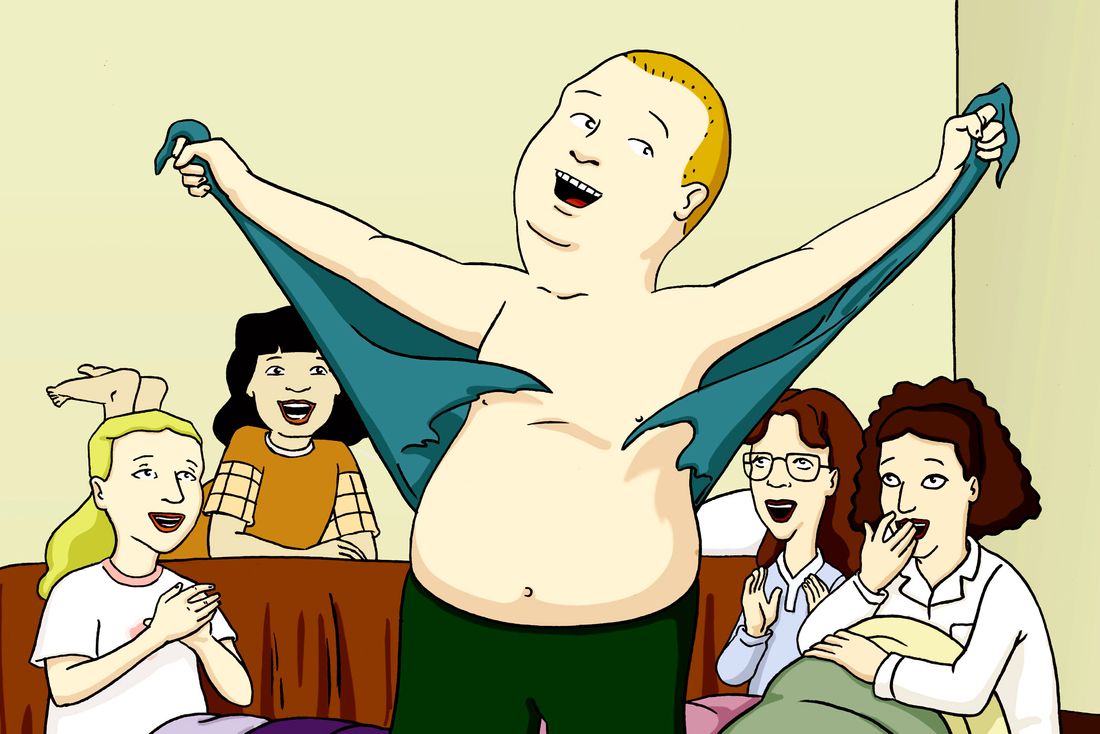
“That’s my purse! I don’t know you!”
The most well-known line from the entire series originates from an episode in season six, titled “Bobby Goes Nuts”. This is when Bobby Hill decides to join a self-defense class for women, due to his struggles with bullying and the fact that all male/boy self-defense classes are already full, with Hank proving to be an ineffective teacher. However, as Bobby learns techniques like kicking men in sensitive areas, he initially feels empowered. Unfortunately, he starts using this method as a solution for every problem he encounters.
Peggy Hill makes an entrance, a woman not often held back by moral constraints. While Hank adheres to an inner male code of honor, Peggy isn’t shy about employing underhanded tactics when necessary. And when Bobby resorts to dirty fighting, she responds by humiliating him and giving him a noogie, all while the neighbors look on. Her methods might be debatable, and the outcome often messy, but one thing is certain: Peggy gets results.
“Hank’s On Board,” Season 10, Episode 1

Discovering that those you thought were your closest friends are spending time together without you can be one of the most disheartening experiences. This is what happens to Hank in “Hank’s On Board,” as he finds out that Dale, Bill, and Boomhauer (Mike Judge) have been intentionally excluding him from their group vacation plans. According to Peggy, this exclusion stems from Hank coming across as bossy around them. However, an unfortunate boating incident later on reveals that Hank is the only one among them who can truly be relied upon as an adult.
In later seasons of “King of the Hill,” while it didn’t suffer the significant decline experienced by many animated shows of its era, there were noticeable decreases in quality. The frequent appearances of celebrity voiceovers sometimes feel excessive and jarring, and the storylines often lack the authentic small-town Arlen charm that characterized the early seasons. However, the opening episode of the tenth season, “Hank’s On Board,” demonstrated that “King of the Hill” could occasionally reconnect with its core human elements.
“Death Picks Cotton,” Season 12, Episode 5
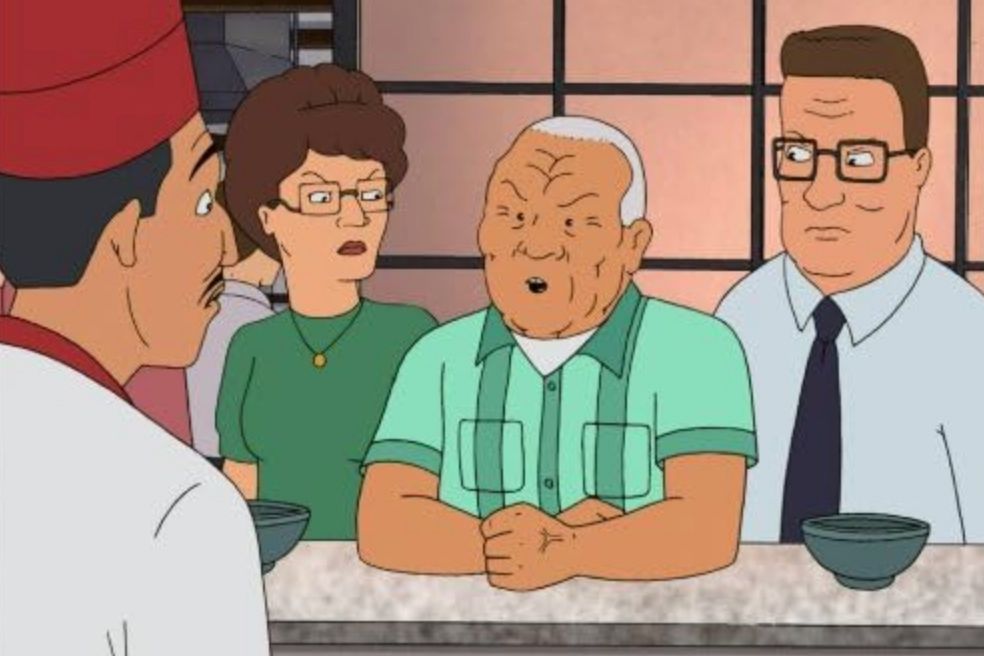
Although Cotton Hill is not typically portrayed as a villain, there are instances where he exhibits empathy, such as in the climax of the sixth season’s “Unfortunate Son,” when he treats a group of Vietnam veterans with compassion. However, he is not the father that Hank requires, and Hank’s attempts to reconnect with him are often met with coldness. In his final moments on his deathbed, Hank tries one last time to reconcile with his father, hoping that he will realize how much he is loved and valued. But Cotton, irritated by Hank’s indirectness and emotional displays, berates his son instead.
In simpler terms, we often hold onto the hope that our parents, no matter how difficult they may be, will eventually understand and appreciate us. We wish for them to recognize the love we’ve always shown them. However, life sometimes teaches us a harsh truth – this understanding might never come. In the television series “King of the Hill,” Peggy expresses her hope that Cotton, her distraught husband, will live forever in his own misery. But Cotton does not reciprocate this sentiment, leaving Peggy unsatisfied. In a dramatic turn of events, he shouts, “Do ya, now?” before passing away. Later, Peggy tells Hank that Cotton’s final words were actually a declaration of love for his son, thus saving him from one last act of cruelty by his father.
“To Sirloin With Love,” Season 13, Episode 24
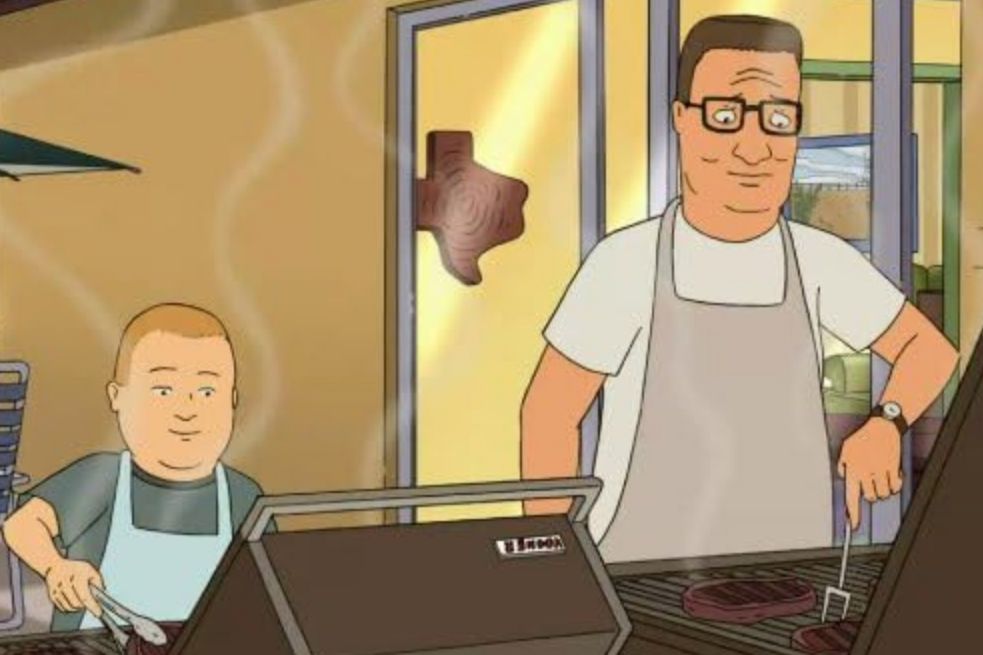
How does the TV show “King of the Hill” conclude? It seems more fitting for the narrative to provide a poignant goodbye rather than in a series that thrived on small, subtle moments. Yet, an emotionless departure wouldn’t align with characters who have consistently demonstrated their feelings through hard work. Instead, the episode titled “To Sirloin With Love” chooses to focus on the aspect where the show has always excelled: the bond between Hank and Bobby.
In this (temporary) conclusion, Hank and Bobby share their passion for grilling meat, and the episode ends with the whole town savoring their culinary skills. The duration of this bonding session is uncertain; in the world of “King of the Hill”, as in reality, it’s evident that a youngster like Bobby’s interests can shift suddenly. However, it’s the special moments, the episodes, where such joy can be experienced together as a family, that truly matter. “That boy ain’t normal,” but he’s the best son that Hank Hill could ever hope for.
Read More
- Who Is Harley Wallace? The Heartbreaking Truth Behind Bring Her Back’s Dedication
- 50 Ankle Break & Score Sound ID Codes for Basketball Zero
- 50 Goal Sound ID Codes for Blue Lock Rivals
- KPop Demon Hunters: Real Ages Revealed?!
- Basketball Zero Boombox & Music ID Codes – Roblox
- Lottery apologizes after thousands mistakenly told they won millions
- Ultimate AI Limit Beginner’s Guide [Best Stats, Gear, Weapons & More]
- 100 Most-Watched TV Series of 2024-25 Across Streaming, Broadcast and Cable: ‘Squid Game’ Leads This Season’s Rankers
- Umamusume: Pretty Derby Support Card Tier List [Release]
- J.K. Rowling isn’t as involved in the Harry Potter series from HBO Max as fans might have expected. The author has clarified what she is doing
2025-07-07 21:55